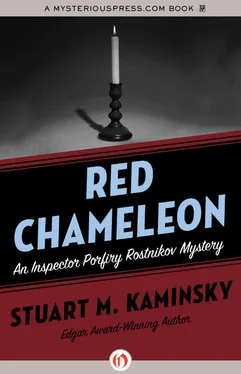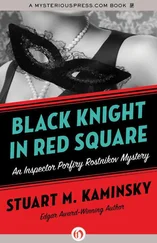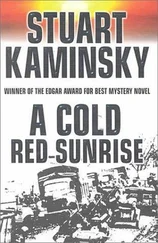Stuart Kaminsky - Red Chameleon
Здесь есть возможность читать онлайн «Stuart Kaminsky - Red Chameleon» весь текст электронной книги совершенно бесплатно (целиком полную версию без сокращений). В некоторых случаях можно слушать аудио, скачать через торрент в формате fb2 и присутствует краткое содержание. Год выпуска: 2012, ISBN: 2012, Издательство: MysteriousPress.com/Open Road, Жанр: Полицейский детектив, на английском языке. Описание произведения, (предисловие) а так же отзывы посетителей доступны на портале библиотеки ЛибКат.
- Название:Red Chameleon
- Автор:
- Издательство:MysteriousPress.com/Open Road
- Жанр:
- Год:2012
- ISBN:978-1-4532-6632-8
- Рейтинг книги:4 / 5. Голосов: 1
-
Избранное:Добавить в избранное
- Отзывы:
-
Ваша оценка:
- 80
- 1
- 2
- 3
- 4
- 5
Red Chameleon: краткое содержание, описание и аннотация
Предлагаем к чтению аннотацию, описание, краткое содержание или предисловие (зависит от того, что написал сам автор книги «Red Chameleon»). Если вы не нашли необходимую информацию о книге — напишите в комментариях, мы постараемся отыскать её.
Red Chameleon — читать онлайн бесплатно полную книгу (весь текст) целиком
Ниже представлен текст книги, разбитый по страницам. Система сохранения места последней прочитанной страницы, позволяет с удобством читать онлайн бесплатно книгу «Red Chameleon», без необходимости каждый раз заново искать на чём Вы остановились. Поставьте закладку, и сможете в любой момент перейти на страницу, на которой закончили чтение.
Интервал:
Закладка:
Going there was a risk, a slight risk, but a risk nonetheless. He had been officially ordered off the case. Were he to be caught, he could, would, simply say that he was informing those involved, the survivors of the victim, that the investigation would continue under another investigator when time permitted. He would argue, explain, that he was tying up loose ends to keep concerned citizens from lodging protests. The argument would be an absurd one. No one would pay attention to a protest from a distraught Jew whose old father had been murdered, but what could they do to Rostnikov? Take his job? If they wanted to dismiss him from his work, they would simply do it. Rostnikov had no illusions. He would continue to work as long as he continued to have a function that no one else could fulfill.
He ground his teeth as he arrived at the third floor and reached down to rub his complaining left leg. He had stopped home briefly to change into his other suit and to lay out his torn jacket neatly with a note to Sarah asking her please to repair it. The note had been carefully worded, brief but examined, to ensure that no word or phrase could give offense. Sarah’s disappointment at their failure to get out of the Soviet Union had been great. At first she had seemed to accept it as inevitable. She took it like a Russian, but as the days passed and she became aware that an occasional KGB man would inquire about her at her work or she thought about the consequences of their failure to obtain permission to emigrate, consequences more for their son Josef than for themselves, she had begun to brood. The brooding got worse when she was dismissed without reason from her job at the music shop. Brooding didn’t become her. She was normally cheerful, open, supportive. Brooding was Porfiry Petrovich’s specialty. A small apartment could not sustain two brooders without the possibility of explosion.
Rostnikov had not called ahead that he was coming. There was no one to call. The Savitskayas had no telephone. Few Russians had telephones. The latest estimate was that in the entire Soviet Union there were no more than 20 million phones compared to more than 140 million in the United States. It was, therefore, a calculated risk to come to the Savitskaya apartment. The woman was a schoolteacher and the boy a student. They might well be home late in the afternoon. It had also struck Rostnikov that Sofiya Savitskaya was not the most social of citizens. As it was, he was proved right. He knocked once, solidly, on the apartment door and was greeted by a dreamy “Who is there?”
“Inspector Rostnikov,” he said, and waited while she came to the door and opened it just enough to see him, a pointless protection, since he could simply push it open.
“What?” she said, one brown eye showing, puzzled and frightened, through the crack.
“I would like to come in and talk,” he said. “What I have to say need not be shared by the neighbors.”
She hesitated and then opened the door for him to enter. She waited till he was all the way in before closing the door. The apartment was hot, moist and hot, in spite of the open window. There was no draft, no opening for the breeze, should one arise, to seek out and enter.
She stood near the door, and he could see over her right shoulder the space from which the photo had been taken. There was something of the fragile bird about the woman that touched Rostnikov, though she was not thin. In fact, she seemed a bemused, disheveled, slightly younger version of his own Sarah, but that might simply be the cautious Jewishness of both women. There was no clear physical characteristic that marked Soviet Jews from other Russians. But there was a look nurtured by hundreds of years of wariness in an always-hostile culture.
“I would like a drink of water,” he said gently.
“A drink of water,” she repeated, as if no command could be acted upon unless programmed through her own voice. She moved, limped, to the small sink, turned on the faucet, and filled a glass for him. Instead of advancing to give it to him, she stood at the sink, holding it out. Rostnikov nodded solemnly and walked over to take it.
She was not pretty, he decided, looking at her as he drank, but there was that air of Cassandra, a distance, a sense that she was listening to voices on another plane. Rostnikov admitted that there was something intriguing about that, something that attracted him. Her air suggested madness, and madness suggested a vision he could not imagine, a fragile creative power that needed protection.
He drank the water and handed the glass back to her before he spoke.
“We have made some progress,” he said.
She looked at him as if she had no idea what he was talking about.
“Progress in finding the killers of your father,” he explained.
“It doesn’t matter,” she said, looking directly at him and making it quite clear that it didn’t matter to her. “All I want is the photograph and the candlestick. Lev and I have very little to remember.”
“When we catch the killers, we will have the candlestick. The killers do not have the photograph, however. We took that, as you may recall. And we will return it shortly.
“I have some names I want to say to you, names of the people who we think were in the photograph. I will say them, and you tell me if your father ever mentioned them, what he said. Can we do that?”
She didn’t answer.
“And can we sit?”
She sat at one of the three wooden chairs at the small kitchen table, and he sat across from her. He considered asking for another glass of water just to keep his hands busy. Most Russians smoked. It was a habit Rostnikov’ had never considered.
“Mikhail Posniky, Lev Ostrovsky, Shmuel Prensky,” he said. “I thought, perhaps, your brother Lev might be named for Ostrovsky, who was one of the men in the photograph.”
“Never,” she said without emotion.
“Your parents would never name-”
“Lev was named for my grandfather. But Mikhail Posniky-I heard that name. My father knew him, went to America with him. I think he died.”
“And Shmuel Prensky?”
“The magic snake,” she answered, looking down at her hands. “The poison snake of gold. To say his name is like saying the name of the Lord. It is forbidden.”
“Your father said this?”
“In the dark, once or twice. At night. To my mother when she lived. Inspector, have you ever thought that being alive is very difficult?”
“I have thought this, yes.”
“And?”
“And I eat my borscht, lift my weights, read my books, do my work.”
“Do you have a wife and children?”
“A wife, a son, a grown son.”
“You said your wife is Jewish. You said that the day my father was killed. Was it a lie?”
Their eyes met and Rostnikov smiled. “It was no lie.”
“Shmuel Prensky is Jewish,” she said almost to herself.
“So were all the men in the photograph,” Rostnikov said in return, wanting to reach out and pat the nervous hand of the woman as it rested on the hard wood table. But he did not reach out.
She shrugged, dismissing the thought.
“Where is your brother?”
“At the home of a friend,” she said. “He grew tired of all the police. All the questions.”
“All the- You mean more policemen came to talk to you since I-since your father’s death?”
Her head was shaking in confirmation.
“They came, asked these same questions. Came again. We can’t move. Can’t hide. We can only sit and answer. In life, no one ever came to see father. Now that he is dead, he has many visitors. Do you think it is hot in here?”
“It is hot,” Rostnikov agreed. “I must go.”
He could tell her now that the investigation was closed. It wasn’t too late. What could she do? Could she cry, wail? This was a woman with dreaded dreams who wanted her candlestick, her photograph, and a reason for insanity.
Читать дальшеИнтервал:
Закладка:
Похожие книги на «Red Chameleon»
Представляем Вашему вниманию похожие книги на «Red Chameleon» списком для выбора. Мы отобрали схожую по названию и смыслу литературу в надежде предоставить читателям больше вариантов отыскать новые, интересные, ещё непрочитанные произведения.
Обсуждение, отзывы о книге «Red Chameleon» и просто собственные мнения читателей. Оставьте ваши комментарии, напишите, что Вы думаете о произведении, его смысле или главных героях. Укажите что конкретно понравилось, а что нет, и почему Вы так считаете.












